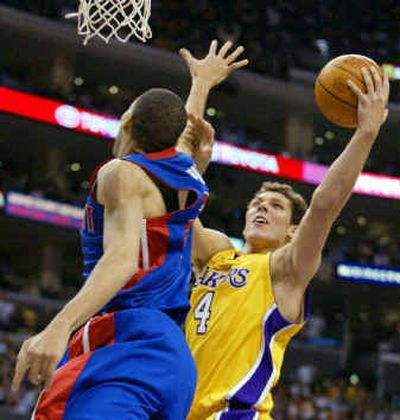Walton plays color-blind

Luke Walton comes from a basketball family. He and his three brothers chose to follow in the footsteps of their famous father, Hall of Famer Bill Walton, and pursue an NBA dream.
But never did Luke Walton, now a rookie with the Los Angeles Lakers, wonder why there were so few others like him — American players with white skin — making that same journey.
“You know, it never once crossed my mind to stand around and count how many white guys were on the floor,” Walton said. “Who would do something like that anyway? Who would care? … I was too busy having fun playing the game to worry about anything like that.”
Others, however, do. An examination of the NBA’s racial makeup suggests there is a dearth of white American players occupying space in NBA locker rooms.
It is an issue that gained attention when Indiana Pacers president of basketball operations Larry Bird, one of the most famous white American players, broached the topic during an ESPN special.
Bird’s assertion was that it would be good for the NBA’s fan base because “as we all know, the majority of the fans are white America. And if you had just a couple of white guys in there, you might get them a little excited.”
Bird chuckled as he made those comments, but he wasn’t joking. And many of his NBA contemporaries, including Magic Johnson, agree and have supported him publicly.
“I totally understand where Larry was coming from when he said that,” said Greg Kelser, the Detroit Pistons’ first-round draft pick in 1979 and a member of the Michigan State team that defeated Bird’s Indiana State team in the NCAA championship game that year. He is black. “And it’s true. People might not want to admit that, but it’s true.”
At the All-Star break in February, 77 percent of the league’s 408 players were black. Only 21 percent were white; of that group, 55 percent were born in the United States and 45 percent are international players.
“I don’t know what (the NBA’s declining number of white players) can be attributed to,” said Kelser, now a broadcaster with Fox Sports Net Detroit. “But maybe it’s like what we’re seeing in baseball with the reduction of black players. Maybe there’s not as much interest on the part of kids.”
That’s a view some of the NBA’s current black players do not share, if only because they’ve seen something different.
“The neighborhood courts were one thing, but in AAU ball and high school and then college, there was always a good mix of guys,” said Detroit Pistons forward Richard Hamilton. “I think kids all over the country love to play basketball, regardless of what color they are.”
No figure is more telling than the dwindling number of American-born white players who have played in the NBA All-Star game recently. Brad Miller has been the lone white American to play in the All-Star game the past two seasons, first with the Pacers and then with the Sacramento Kings.
“Race really isn’t an issue in the NBA,” Miller said. “And this whole thing has brought that on us for the first time in a long time.”
Malone won’t be prosecuted
Karl Malone will not be charged in a confrontation with a fan who said the Lakers’ forward poked him in the face before Game 3 of the NBA Finals.
Oakland County Prosecutor David Gorcyca said that Malone did put a finger on Happy Asker’s cheek, but it wasn’t enough to warrant prosecution.
“I don’t think that he intended to hurt him,” Gorcyca said.
Asker, 28, of Southfield heckled and swore at Malone before the player responded and poked at him, Gorcyca said.
The prosecutor also said that Asker, who attended the game with his brother, Diah Asker, 31, of San Diego, claimed to have paid a ticket scalper $25,000 for a pair of tickets to the game.
Gorcyca noted that buying the scalped tickets was illegal and therefore the men’s presence in The Palace was illegal.
Bryant offers guarantee?
Nothing stands in the way of reporters on the trail of a guaranteed victory — not even when the player in question can’t remember guaranteeing anything.
At the bottom of a column in a Los Angeles newspaper following the Lakers’ 88-80 loss to the Detroit Pistons on Sunday night, Bryant was quoted as saying: “I’m telling you right now, we’ll win Tuesday.”
That would be Game 5 of the NBA Finals tonight, when the Lakers will face elimination.
The newspaper never claimed Bryant guaranteed a victory, but that didn’t stop reporters on Monday from peppering Bryant, his teammates and the Pistons with questions about a guarantee.
“I don’t understand your question. I promised?” Bryant asked in bewilderment. “I’ll go with that, man. It’s fine with me.”
The rest of the players also didn’t get it, though the Lakers couldn’t exactly reply negatively to loaded questions asking whether they had to win Game 5.
“That makes two of us,” Rick Fox said when told Bryant predicted a win. “All we need is about six more people to come with us.”